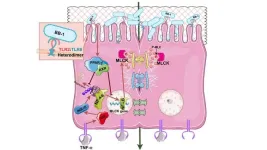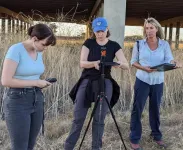Columbia receives $400 million gift for biomedical research
The gift from Roy and Diana Vagelos is the largest in Columbia medical school’s history
2024-08-22
(Press-News.org) NEW YORK, NY (Aug. 22, 2024)--Columbia University announced today a new $400 million gift from Roy and Diana Vagelos, which will secure Columbia’s leadership in biomedical science research and education and produce a vast array of compelling opportunities for improving society’s health and wellbeing. The gift is the single largest ever made to Columbia’s medical school and, taken together with their previous giving, establishes Roy and Diana as the most generous donors in the history of Columbia University.
A principal function of this gift will be to significantly expand the mission of the Vagelos-funded institute created in 2023. The Roy and Diana Vagelos Institute for Basic Biomedical Science will now provide the infrastructure to unite cutting-edge research taking place in Columbia’s basic science departments, its leading medical and graduate education programs, and the exemplary research initiatives in its clinical departments in a new dynamic organizational model. By assembling this mix of mutually reinforcing activities, we seek to build the world’s foremost ecosystem for biomedical research and to attract the next generation of exceptionally creative and collaborative scientists able to realize this vision.
The gift announced today also will support construction of the new biomedical research building, to be known as the Vagelos Innovation Laboratories, at 167th Street and Audubon Avenue, on the Washington Heights medical campus. This facility will provide more than 55,000 square feet of new laboratory space. This new building will be a model of sustainability: the very first fully-electrified, university-owned laboratory building in New York City.
Roy and Diana’s generous gift also provides major support for the medical school’s programs in cell engineering and gene therapy and will expand innovative collaborations that harness recent breakthroughs and new technologies. Research to advance these next-generation therapies will revolutionize treatment for a wide variety of diseases ranging from disorders of the blood and immune system to cancers, metabolic disorders, and inflammatory, neurological, and cardiovascular conditions, representing a new paradigm in medicine.
The legacy of Roy and Diana Vagelos at Columbia University and in the world of philanthropic support for biomedical research and education was already well established before the announcement of this historic gift. They are unique benefactors guided by laudable values that became guiding principles for our school. Their sustained commitment to education, scientific research, and human health, in general—and to Columbia, in particular—is simply unmatched. From the construction of the spectacular Vagelos Education Center, to the creation of a scholarship initiative that sparked a nationwide revolution to address affordability in medical education, the impact of their philanthropy will extend far beyond Columbia and be felt for generations to come.
###
Columbia University Vagelos College of Physicians and Surgeons (VP&S) is the medical school of Columbia University Irving Medical Center, a clinical, research, and educational campus located in New York City. Founded in 1767, VP&S was the first medical school in the United States of America to award the Doctor of Medicine (MD) degree. For more information, please visit vagelos.columbia.edu.
END
ELSE PRESS RELEASES FROM THIS DATE:
2024-08-22
BUFFALO, N.Y. — Air pollution is bad for mental health. That much is clear. Now, new research shows the impact may be even worse in neighborhoods that were historically redlined.
University at Buffalo researchers looked at 17 cities across New York State where longstanding federal housing policies once denied neighborhoods with people of color from receiving mortgages. Although this practice was outlawed in 1968, the researchers found that elevated levels of air pollutants in these neighborhoods of the state ...
2024-08-22
An international team of 45 researchers studying meteor showers has found that not all comets crumble the same way when they approach the Sun. In a paper published in the journal Icarus this week, they ascribe the differences to the conditions in the protoplanetary disk where comets formed 4.5 billion years ago.
“The meteoroids we see as meteors in the night sky are the size of small pebbles,” said lead author and SETI Institute and NASA Ames meteor astronomer Peter Jenniskens. “They are, in fact, the same size as the pebbles that collapsed into comets during the formation of ...
2024-08-22
August 22, 2024 — The groundbreaking ChatGPT chatbot shows potential as a time-saving tool for responding to patient questions sent to the urologist's office, suggests a study in the September issue of Urology Practice®, an Official Journal of the American Urological Association (AUA). The journal is published in the Lippincott portfolio by Wolters Kluwer.
The artificial intelligence (AI) tool generated "acceptable" responses to nearly one-half of a sample of real-life patient questions, according to the new research ...
2024-08-22
Research from Radboud university medical center reveals that T cells from the adaptive immune system can manipulate the memory of innate immune cells. Previously, it was believed that the memory of innate immune cells operated independently. This surprising connection opens up new possibilities for the treatment of various diseases. A mouse model shows that no immunosuppressive drugs are needed after an organ transplantation if this interaction between T cells and the innate immunity is temporarily blocked after the transplantation.
The adaptive immune ...
2024-08-22
GRAND RAPIDS, Mich. (Aug. 22, 2024) — Immune cells use two different routes to produce acetyl-CoA, an essential metabolite required to fight infection and cancer, reports a study led by Van Andel Institute scientists.
The findings, published in the Journal of Experimental Medicine, could help improve immunotherapies by revealing how diet can boost immune cell function.
“Like any good system, immune cells have a plan A and a plan B,” said Russell Jones, Ph.D., the study’s corresponding author and chair of VAI’s Department of Metabolism and Nutritional ...
2024-08-22
Many quantum devices, from quantum sensors to quantum computers, use ions or charged atoms trapped with electric and magnetic fields as a hardware platform to process information.
However, current trapped-ion systems face important challenges. Most experiments are limited to one-dimensional chains or two-dimensional planes of ions, which constrain the scalability and functionality of quantum devices. Scientists have long dreamed of stacking these ions into three-dimensional structures, but this has been very difficult ...
2024-08-22
Philadelphia, August 22, 2024 – There is a critical unmet need to help tighten and maintain a healthy intestinal barrier and treat a leaky gut. Researchers have now found that a unique strain of probiotic bacteria, Bifidobacterium bifidum BB1, enhances intestinal barrier function and protects against penetration of bacteria and various harmful agents in the intestine. The findings, detailed in an article in The American Journal of Pathology, published by Elsevier, can help advance the development of novel, targeted, naturally occurring probiotic therapy for patients with inflammatory bowel disease (IBD) and other inflammatory diseases, such as fatty liver disease or alcoholic liver ...
2024-08-22
Researchers from the University of Colorado College of Nursing and CU School of Medicine on the Anschutz Medical Campus were awarded a $1.35 million grant from the Agency for Healthcare Research and Quality (AHRQ) to design and implement technologies that improve resident safety and employee wellbeing at long-term care facilities.
“Long-term care facilities in the United States are in crisis, they’re facing low resources and high staff turnover,” CU Nursing Associate Professor and ...
2024-08-22
Researchers at the Wyss Institute for Biologically Inspired Engineering at Harvard University report that they were able to successfully put tadpoles of Xenopus laevis frogs into a hibernation-like torpor state using donepezil (DNP), a drug approved by the FDA to treat Alzheimer’s. The team had previously used another drug, SNC80, to achieve similar results in tadpoles and enhance the survival of whole mammalian hearts for transplants, but SNC80 is not approved for clinical use in humans because it can cause seizures. By contrast, DNP is already being used in the clinic, meaning it potentially could be rapidly repurposed ...
2024-08-22
Preventing the next pandemic begins before diseases emerge. This “pre-emergence” phase is the focus of a new center funded by the U.S. National Science Foundation and led by the University of California, Davis.
Supported with $18 million over seven years, the U.S. National Science Foundation Center for Pandemic Insights (NSF CPI) includes partnering institutions from across the United States. It aims to harness new technologies and develop sensing to detect, investigate, and ultimately prevent ...
LAST 30 PRESS RELEASES:
[Press-News.org] Columbia receives $400 million gift for biomedical research
The gift from Roy and Diana Vagelos is the largest in Columbia medical school’s history






